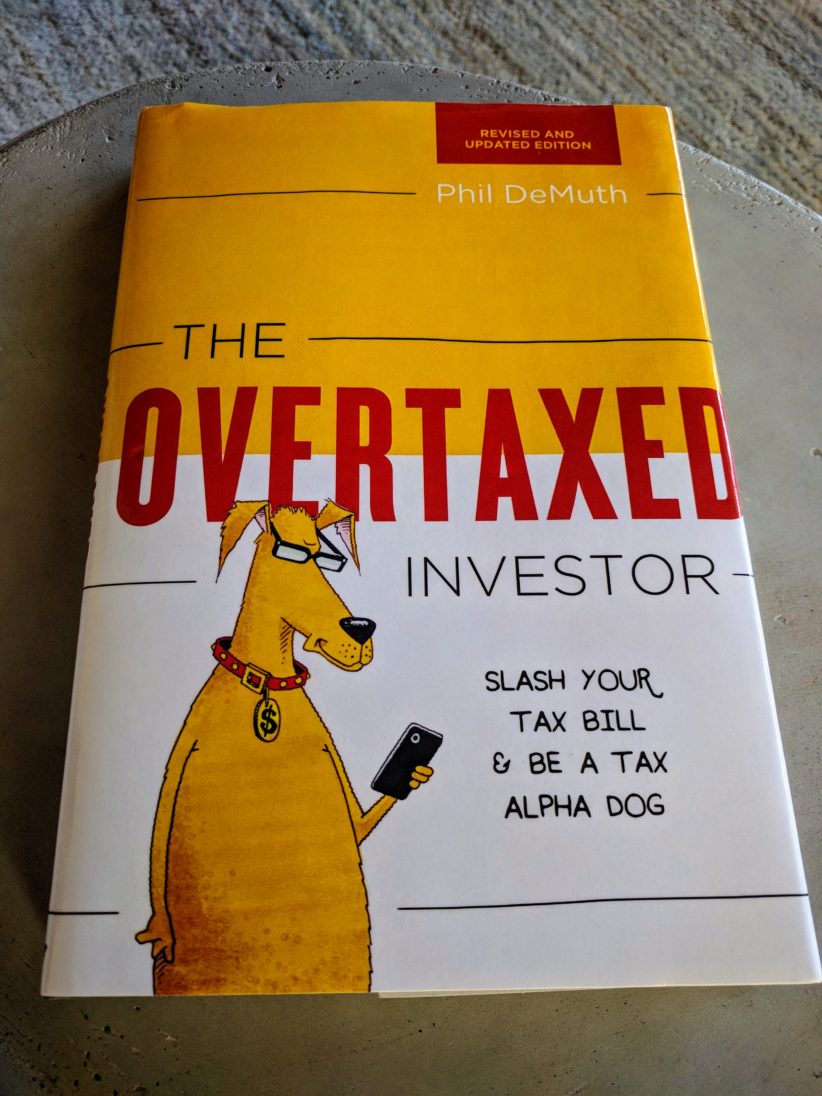At the recent WCI Con 20 (which overlapped with recognition that the US COVID pandemic had begun) I enjoyed Phil DeMuth's lecture. I was pleasantly surprised that one of the goodies in the swag bag I took home was the revised 2020 edition of his book, The Overtaxed Investor.
It's broad scope and appropriate critiques of the new realities under the SECURE Act were timely and useful.
Rather than go chapter by chapter, I thought it worth reviewing a few nuggets that a physician investor with a modicum of financial literacy might find interesting or illuminating.
- When setting default choices for cost basis reporting in your taxable brokerage account, it's preferable to choose the option that preferentially sells short-term losses, then long-term losses, then long-term gains. Depending on the brokerage, this default selection may go under the name of Tax Sensitive, Tax Lot Optimizer or Best Tax. Not all brokerages make these options available, but keep an eye out for those that do.
- For IRAs, be certain to name people as primary and secondary beneficiaries. The SECURE Act has eliminated the advantage of naming a retirement trust as the beneficiary.
- For kids in graduate school over the age of 24, assuming 529 plans have been spent down in the undergraduate years, consider gifting them $15k of appreciated securities annually ($30k total if one gift given from each parent) as part of the annual individual gift allowance. Your "kid" can then immediately sell the securities to pay for grad school while they are likely poor and in the 0% capital gains tax bracket. You avoid paying capital gains on your lowest basis securities. Everyone wins.
- Overfunding a 529 plan can serve as a means of moving assets out of an estate. Let's take the following scenario: wealthy grandparent, less wealthy child, unborn grandchild. Leave the unspent amount inside the overfunded 529 plan for the child, and when the grandchild is born the child uses the gift tax exclusion in 5 year increments to transfer the plan's assets to the grandchild until the old plan is empty.
- How do you decide if it's better to hold municipal vs. taxable bonds in your taxable account? Take the yield the municipal bond offers and divide it by (1 minus your marginal tax rate) to calculate the yield you would require from your taxable bond to obtain the same after-tax yield. This is helpful if you believe that bonds go in taxable. It depends.
- Buy CDs and T-bills that don't pay interest until they mature in the following year.
- It's better to die married - this qualifies you for your deceased spouse's unused exemption. (Phil is unsentimental in his approach to advocating for lower taxes).
- Ensure you are not automatically reinvesting dividends in your taxable account as you approach retirement.
- In the post-retirement, pre-RMD period (a.k.a. the bridge), save cash in taxable both to use for living expenses during this in-between period and to pay for Roth conversions.
- 401k plans are covered by ERISA and can offer better protection from creditors than an IRA, depending on your state.
While this is not a formal book review, at least not in the tradition of prior reviews I've done, I found Phil's writing style to be droll and entertaining, and his content to provide a breadth of strategies for high income professionals.
I enjoyed the introductions to some exotic strategies affecting the 0.1% ("Death is not the end. There remains the litigation over your estate.")
Then there were changes that are highly pertinent to most docs, such as the SECURE Act's death knell to the stretch IRA.
Finally (pun intended), there is also great attention paid to end of life considerations for the surviving spouse, like avoiding the RMD tax bomb that occurs when one spouse dies: the surviving spouse suddenly inherits an additional IRA, resulting in a much larger RMD at precisely the time when the change in tax brackets moves from Married Filing Jointly to Single.
If you are a JV or varsity level finance buff looking to up your game, I'd highly recommend Phil DeMuth's The Overtaxed Investor as part of your Advanced Placement curriculum.


Comments 2
Hi CD,
Regarding the first point (selecting tax lots) — I’m glad you brought this up! Screwing this up can have real tax consequences. My broker uses FIFO (First In First Out) as the default but I manually changed it to LIFO (Last In First Out). This way, the securities that I sell default to the most recent ones and preserves the long term shares that will have long term capital gains.
For example, in Etrade, you can find it by going to:
1. Account preferences
2. Tax Preferences
3. Lot selection
Even with this all in place, I can tell you that I have had multiple brokers screw this up. The good news is, you can also “swap tax lots” even after a trade has been made.
I hope this helps!
Author
TSMD,
Appreciate the Etrade specifics as well as the good news in swapping tax lots – was not aware of the latter option.
I’d had my account at Vanguard for several months before I realized their defaults were not conducive to tax loss harvesting.
Phil’s book had a number of gems like this that I wish I’d known when I first started along the DIY investor path.
Thanks for the pointers,
CD